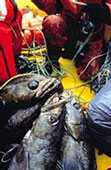|
Fisheries in crisis — Fish are the last wild creatures on Earth to be hunted on a large scale, and like many other renewable resources are already being exploited to the limit. The chief culprit is overfishing by industrial fleets, mostly from developed countries. This crisis in fish stocks has now reached major proportions - over 60% of the world's fish stocks are 'in urgent need of management' because of overfishing, according to the UN.
So desperate has the situation become that several commercial fish species - including Atlantic cod, haddock and bluefin tuna - are now on the endangered species list. In fact, the worldwide collapse of fish stocks has already started. When early explorers arrived at Newfoundland's Grand Banks in 1500, they reported that fish were so plentiful they could simply be hauled out of the sea in baskets. In 1993, after centuries of over-exploitation, the Grand Banks fishery was closed down completely - with the loss of 40,000 fishermen's jobs.
A net loss — The world marine catch stands at nearly 100 million tonnes per year. However, 25 per cent of this is 'cheap fish' - such as pollack, jack mackerel and pilchards - most of which ends up as animal feed.
A further 27 million tonnes of 'by-catch' - nearly a third of the global catch - is thrown back dead into the sea. In the Gulf of Mexico shrimpers throw back 4 kilograms of dead fish for every kilogram of shrimp they actually catch. On a wider scale this death toll includes thousands of dolphins and porpoises as well as vulnerable species such as turtles, billfish and sharks.
Fisheries are also threatened by marine pollution - including agricultural run-off from land, untreated sewage disposed of at sea, and sediments from rivers whose watersheds are exposed by deforestation. In addition, rising ocean temperatures resulting from global warming are in danger of wiping out some species altogether. Winter temperatures in the North Sea have been 4 degrees Celsius above normal for six years - seriously disrupting cod breeding patterns.
Fish flow North — Having decimated their own stocks, high-tech Northern vessels have headed south, where their largely unmonitored activities have depleted stocks and undermined local livelihoods.
In the productive waters off northwest Africa, foreign fleets run by industrialised countries take over six times as much fish as local fishermen. Most of the fish traded internationally comes from the South but ends up in the North, where people eat an annual average of 27 kilograms of it - triple that of the South, where fish may be crucial in the local diet. All but one of the 40 countries where fish is the main source of protein are in the South. But pressure from foreign fleets and the export-driven policies of indebted Southern governments means the most malnourished part of the world is forced to forgo some of its supply of a rich source of protein and other vital nutrients.
Too many boats — Government subsidies have allowed national fisheries in the North to swell to an unsustainable size. In 1997 the fishing industry in Europe received subsidies totalling US$1.4 billion - about $14,000 per boat. This cash funds overcapacity - WWF estimates that Europe has 40 per cent more boats than needed to catch fish on a sustainable basis.
Worldwide there are now one million 'industrial' fishing vessels - the world's fishing fleet doubled between 1970 and 1990. The result of too many boats chasing too few fish is conflict. In 1995 Spain and Canada came to blows after a high-seas chase revealed that a Spanish trawler was catching undersized halibut near Canadian waters. In 1996 the Indian government was forced to stop issuing fishing licences to foreign trawlers after protests by small-scale fishermen - who at one point burnt 14 trawlers, seized four others and held a vessel operator hostage.
Small and needy — Around 200 million of the world's poorest people depend on fishing for all or part of their livelihood. In contrast large-scale fishing employs only about 200,000 people.
In developing countries, the small-scale sector produces more economic and social benefits than the industrial one. It uses less capital and fuel, generally more selective gear, is based in rural areas and usually produces more food for the domestic market than for export. Fish for export are caught with less waste than in the over-subsidised industrial sector. Women traditionally play key roles in marketing and processing the catch, but may be displaced by modernisation. Synthetic nets will be factory-made rather than hand-woven, and fish caught by bigger boats will be landed at distant ports rather than on the beaches.
The good news — The long marginalised small-scale sector is becoming better organised. Scientists and other professionals formed the International Collective in Support of Fishworkers in 1984. And in 1997, fisherworkers launched their own international organisation, the World Forum of Fish Workers & Fish Harvesters. The global fisheries crisis is often ascribed to 'too many fishermen chasing too few fish'. These groups disagree. They want to see more people earning a livelihood from better-managed, less industrialised fisheries that help sustain communities and
conserve this vital resource for future generations.
|
